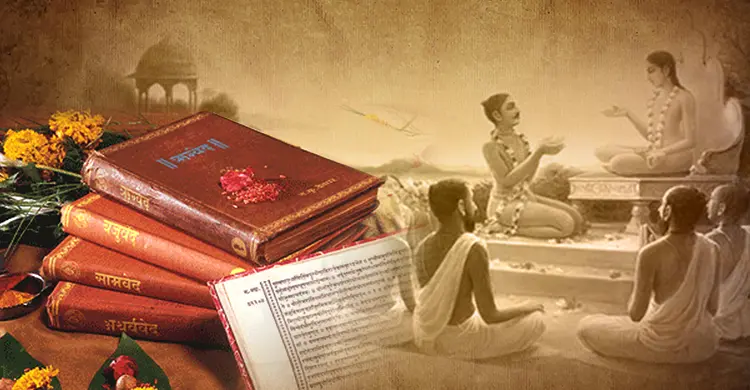
Introduction
The Vedas are a collection of ancient sacred texts that form the foundation of Hinduism. Composed in Sanskrit, they are among the oldest religious writings in the world, dating back to between 1500 and 500 BCE. The term “Veda” means “knowledge” in Sanskrit, and these texts are considered to be the repository of spiritual and philosophical knowledge in Hindu tradition.
Structure and Composition
The Vedas are divided into four main collections:
- Rigveda
- Samaveda
- Yajurveda
- Atharvaveda
Each Veda is further divided into four parts:
- Samhitas: These are collections of hymns, prayers, and mantras.
- Brahmanas: Prose texts that explain the rituals and the meaning of the Samhitas.
- Aranyakas: “Forest treatises” that serve as a bridge between the ritualistic Brahmanas and the philosophical Upanishads.
- Upanishads: Philosophical texts that explore the nature of reality, the self, and the universe.
The Rigveda
The Rigveda is the oldest and most important of the Vedas. It consists of 1,028 hymns organized into ten books called Mandalas. The hymns are dedicated to various deities, such as Agni (fire), Indra (warrior god), and Soma (a sacred plant and associated deity). The Rigveda’s hymns are primarily composed for recitation during rituals and ceremonies.
The Samaveda
The Samaveda is essentially a collection of melodies (saman) and is intended for the singing of hymns. It is closely related to the Rigveda, as many of its verses are derived from the Rigveda’s hymns. The Samaveda is crucial for the performance of soma sacrifices, which are important Vedic rituals.
The Yajurveda
The Yajurveda is a compilation of ritual offering formulas (yajus). It contains detailed instructions for the performance of rituals and sacrifices, making it a practical guide for priests. The Yajurveda is divided into two versions: the Shukla (White) Yajurveda and the Krishna (Black) Yajurveda. The difference lies in the arrangement and content of the mantras and their accompanying prose explanations.
The Atharvaveda
The Atharvaveda is distinct from the other three Vedas in both content and style. It includes hymns, spells, and incantations meant for domestic use and addresses issues such as healing, protection, and everyday concerns. The Atharvaveda is considered a more eclectic and less ritualistic text compared to the other Vedas.
Philosophical Insights: The Upanishads
The Upanishads, often referred to as Vedanta (“the end of the Vedas”), are the philosophical core of the Vedic tradition. They delve into concepts such as Brahman (the ultimate reality), Atman (the individual soul), and Moksha (liberation). The teachings of the Upanishads form the basis for many later philosophical systems in Hinduism, including Vedanta, Yoga, and Sankhya.
The Influence and Legacy of the Vedas
The Vedas have profoundly influenced Hindu culture, religion, and philosophy. They are considered shruti (“that which is heard”), signifying their divine origin and authoritative status. The rituals, hymns, and philosophies contained within the Vedas continue to be central to Hindu worship and thought.
The Vedas also hold a significant place in the study of ancient languages and cultures. Their preservation over millennia offers invaluable insights into the early Indo-Aryan civilization and its linguistic, social, and religious practices.
Conclusion
The Vedas are not just religious texts but are a comprehensive guide to the spiritual, ritualistic, and philosophical life of ancient India. Their teachings continue to resonate with and influence millions of Hindus around the world today, serving as a timeless source of wisdom and inspiration. The Vedas’ profound impact on Hinduism and their lasting legacy in the broader context of world spirituality make them an unparalleled treasure of human knowledge.




